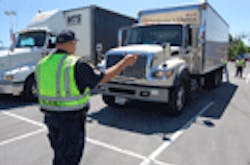LANDOVER, MD – Amid an omnipresent rumble of diesel engines, inspectors from the Maryland State Police, Federal Motor Carrier Safety Administration (FMCSA), and other law enforcement groups stationed here at one of the massive parking lots surrounding the FedEx Field pro football stadium fanned out to begin checking hundreds of commercial trucks and drivers for safety violations.
The effort at FedEx Field is being repeated across the U.S. and Canada as well as in parts of Mexico as the annual 72-hour roadside safety blitz dubbed “Operation Roadcheck” gets under way. The program targets unsafe commercial trucks and buses as well as their drivers.
(See a photo gallery from the Roadcheck event)
Sponsored by the Commercial Vehicle Safety Alliance (CVSA), the yearly Roadcheck events – held since 1988 – garner support not only from law enforcement and government regulatory agencies but the trucking industry itself. These and other diverse parties use this massive effort as a catalyst of sorts to bring greater attention to highway safety issues.
“This event underscores how serious and important our task is – making sure we have the optimum environment for operating safely on our highways,” said Francis “Buzzy” France, CVSA president.
“We are here today to convince others to join this cause,” he added, “Crashes still occur because of faulty or ill-maintained equipment. People still die because of fatigued and unsafe drivers. We need to convince others that they can make a difference in making the roads safer for all.”
Major Pete Landon of the Maryland State Police estimated that his troopers – aided by other personnel from the state comptroller’s office, Maryland department of the environment, and others – would inspect some 700 vehicles during the first day of Roadcheck alone at the Landover site, with some 30% of them placed out of service for vehicle or driver violations.
(See video from the Roadcheck event)
These are not “random” inspections, however, Landon stressed, as his troopers deliberately target fleets with a history of safety violations or equipment that looks ill-maintained.
Anne Ferro, Administrator of the Federal Motor Carrier Safety Administration, said that from sun up on Tuesday June 8 until sundown on Thursday June 10, more than 70,000 roadside inspections will be conducted.
(See video of Anne Ferro discussing the Roadcheck)
“Drivers will be pulled over and asked to show their CDL [commercial driver’s license], medical examiner’s certificate and record of duty status – because rested drivers are safe drivers,” Ferronoted. “Brakes, tires, lights will be tested. Every major component of the truck or bus will be examined.”
Ferro added that FMCSA studies have shown that drivers play a role in nearly nine out of ten large truck crashes involving fatalities. “It’s not just the tires, lights and brakes – the driver is a critical part of Roadcheck,” she stressed. “And lives will be saved as a result. In fact, the inspections conducted during last year’s Roadcheck event resulted in 17 lives saved and 307 injuries avoided.”
“These roadside inspections are not just occurring over the next 72 hours, they are being done each and every day – nearly 4 million times a year,” added CVSA’s France.
“It’s our job to create a driving environment where everyone who shares a road – whether it’s the biggest 18 wheeler, the smallest family car, or a bicycle – can do so safely,” noted Victor Mendez, Administrator of the Federal Highway Administration (FHWA).
“The numbers show that we’re succeeding, as last year the number of highway fatalities reached their lowest level in more than 50 years,” he said.
In 2009, according to National Highway Traffic Safety Administration (NHTSA) data, 33,963 people died on U.S. highways – a drop of 8.9% when compared to the 37,261 deaths reported in 2008, the lowest level since 1954. Even more striking, the fatality rate for 2009 declined to the lowest ever recorded: 1.16 fatalities per 100 million vehicle miles traveled (VMT), down from 1.25 fatalities per 100 million VMT in 2008.
“But there’s still a lot more work to do; even one death is one too many,” Mendez added. “Highway safety also demands that we make the roads themselves safer… by relieving congestion, re-designing interchanges and making other improvements that will enhance safety and keep traffic flowing. When you add all this up, you have a highway system that can serve the needs of the parent on their way to work, the family on vacation, and the truck driver doing his or her part to keep the American economy moving.”
“If there is one thing you take away from today, it should be this: Accountability starts with you,” stressed SVSA’s France. “Everyone has a role, no matter who you are or where you stand. Each of us can educate others – whether they are commercial vehicle drivers or passenger car drivers – about the importance of safe driving.”
About the Author
Sean Kilcarr
Editor in Chief
Sean Kilcarr is a former longtime FleetOwner senior editor who wrote for the publication from 2000 to 2018. He served as editor-in-chief from 2017 to 2018.
